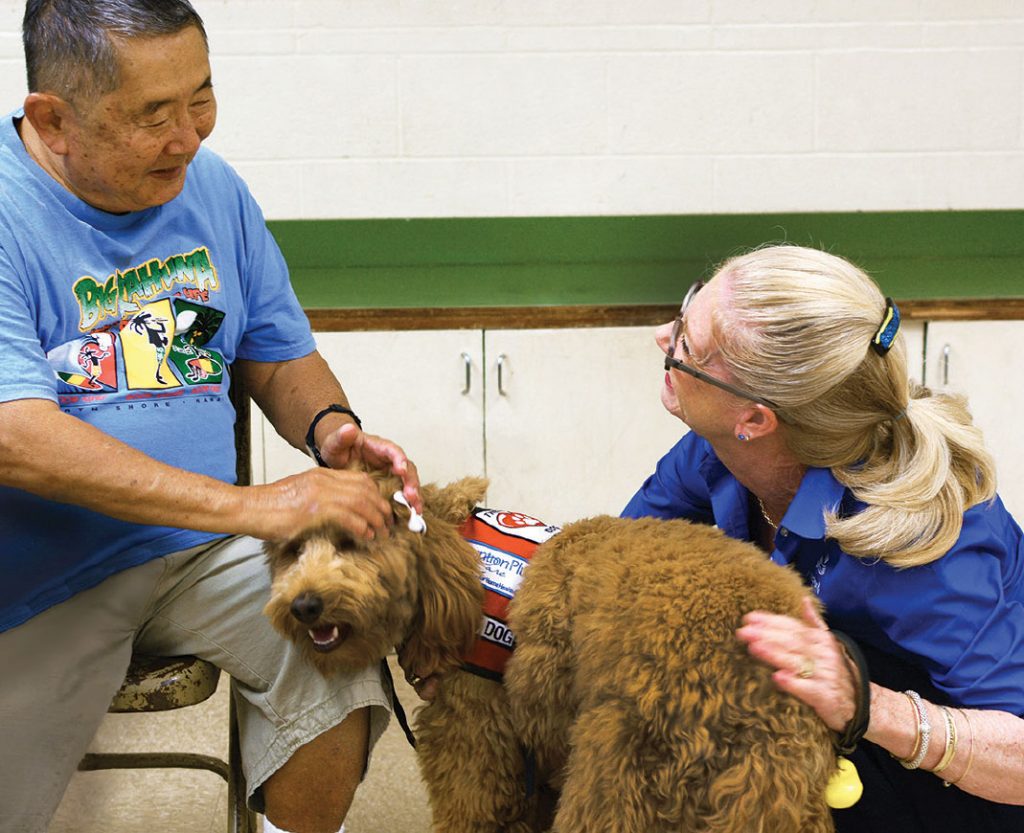
Her coat is stylish and doesn’t affect her walking on all fours. In fact, she couldn’t be happier visiting her patients in the hospital or their homes. And like most professionals, she delights when rewarded with a scratch behind her ears. Well, as you might have guessed, she is a therapy dog; her name is Ruby.
Ruby, a highly trained labradoodle, is recognized by the American Kennel Club (AKC) as a certified therapy dog. She volunteers most of her time visiting children and adults in the hospital or their homes.
“Ruby truly enjoys being with her clients,” said her handler, Carol Samples, RN and CEO of Attention Plus Care. “She can connect and help people in a way where other treatments cannot.
Ruby is the product of her breed and the special training she has received. Her talent for boosting morale can be life-changing for some clients.
Pet therapy, also called animal-assisted therapy (AAT), has been observed as having a positive effect on seniors. A one-year study of approximately 1,300 adults aged 65 or older (published in the Journal of the American Geriatrics Society) found that companion animals had a positive effect on their activities of daily living (ADLs). Older adults without pets experienced a decline in ADLs compared to similar groups with pets, the study revealed.
A study in the Journal of Gerontology also found that a therapy dog had a positive effect on residents at long-term care facilities. Residents engaged with a therapy dog experienced less loneliness after the end of the six-week study. The study also found that one 30-minute session a week with a therapy dog significantly reduced participant loneliness.
“We notice a decrease in blood pressures and increase in smiles when Ruby visits our medically fragile patients,” said Samples. “The effects are profound and bring a sense of joy to those who can’t have a pet in their life.”
AAT for seniors has also been shown to help Sundowner’s Syndrome, evening periods of agitation and confusion in those with Alzheimer’s disease and dementia. Touching and being touched by a therapy dog provides tactile and cognitive stimulation for patients and improves their sense of well-being.
Dr. Michael McCulloch, a Portland psychiatrist, studies why pets are therapeutic. His research reveals that the therapeutic effect is linked to one basic human need.
“Touch is one of our primary needs when we’re born and one of our last needs to go.”
— Dr. McCulloch
Ruby just thinks it’s good, furry fun.
ATTENTION PLUS CARE Accredited by The Joint Commission
1580 Makaloa St., Ste. #1060, Honolulu, HI 96814
808-739-2811 | www.attentionplus.com
Available monthly:
Aging in Hawaii Educational Outreach Program
by Attention Plus Care – a program to provide resources for seniors and their families, instructed by a registered nurse, who covers a different aging topic each month.
For more information on Animal Assisted Therapy and
free community workshops on Aging in Hawai‘i hosted by Attention Plus Care, call 808-440-9372.


Leave a Reply